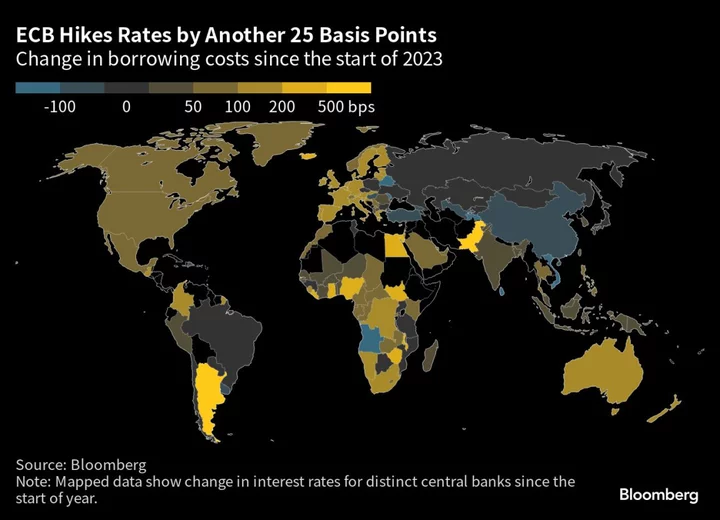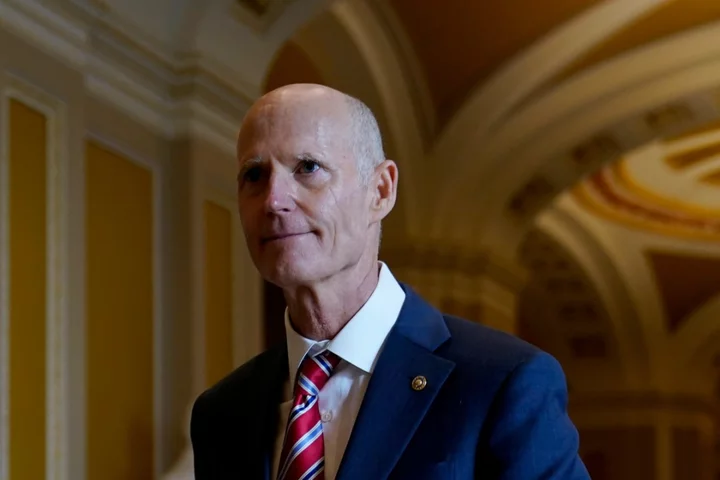The European Central Bank lifted interest rates by another quarter-point, with President Christine Lagarde describing a further hike in July as “very likely.”
The deposit rate was raised to 3.5% on Thursday — the highest level in more than two decades and in line with the expectations of economists and traders.
Speaking less than a day after the Federal Reserve left borrowing costs unchanged following 10 straight increases, Lagarde was clear that inflation in the euro zone is set to stay “too high for too long” and that the ECB isn’t done tackling it yet.
While she wouldn’t be drawn on the rate outlook beyond next month, markets ramped up bets on another hike at the following meeting, in September. People familiar with officials’ thinking said a heated summer debate is likely over what to flag in advance of that.
“Do we still have ground to cover? Yes,” Lagarde told reporters in Frankfurt. “And I can even go further than that: I can tell you that barring a material change to our baseline, it is very likely the case that we will continue to increase rates in July.”
The remarks leave the door open for the ECB to pause after that month — as analysts widely anticipate. But money-market traders boosted rate-hike expectations, implying an almost 80% probability of the ECB raising rates to 4% by October — up from 50% earlier.
“We believe risks to the terminal deposit rate of 3.75% are skewed to the upside,” said Anna Stupnytska, Global Macro Economist at Fidelity International, citing “significant uncertainty about the inflation process and the central bank’s focus on lagging data.”
The ECB’s decisions were underpinned by fresh quarterly projections suggesting inflation will moderate more slowly than previously envisaged, to 2.2% in 2025. That’s still above the 2% target but down from current levels of about three times the goal. Economic expansion in the 20-nation euro zone is seen a little weaker following recent data revealing a mild winter recession.
“The outlook for economic growth and inflation remains highly uncertain,” Lagarde said.
Officials also confirmed a halt in reinvestments under their €3.2 trillion ($3.5 trillion) Asset Purchase Program from next month — another tightening move that was flagged at May’s policy meeting.
Central banks in advanced economies are approaching the final stages in their onslaught against the global inflation shock. They’re keen to ensure, however, that prices have been tamed. The Fed struck a hawkish tone in pausing on Wednesday. Australia and Canada have unexpectedly resumed rate increases.
Supporting the idea that Thursday’s hike could be the ECB’s penultimate, the latest inflation readings showed both the headline and core gauges coming in below analyst estimates, while expectations among consumers also retreated significantly.
Underlying price gains that exclude things like food and energy could yet tick up over the summer, however. Lagarde has said there’s “no clear evidence” that the measure, which has become officials’ key focus, has peaked.
Wary that rising wages are exerting more durable upward pressure on prices, some of her colleagues have stressed the need for further tightening. Bundesbank President Joachim Nagel has said the so-called terminal rate may not be reached in the summer, implying a peak of 4% or higher despite Germany’s recent economic woes.
His French counterpart, Francois Villeroy de Galhau, has been more cautious, saying the ECB’s remaining steps will be “relatively marginal.”
A major uncertainty is how the economy is coping with the most forceful tightening push in the ECB’s history — 400 basis points to date. While banks’ credit conditions have clearly toughened, it’s less obvious how that’s filtering through to firms and households.
The bond market is already showing signs of unease. The yield on 10-year German bonds is around 60 basis points lower than two-year notes, an anomaly that suggests some investors see rates eventually being cut to soften the blow of economic strife.
Renewed turbulence in the financial sector also remains a risk. The end of June will see lenders return €477 billion in long-term loans that the ECB dished out during the pandemic to help keep credit flowing. While overall liquidity is still abundant, analysts have warned that individual banks may face pressure as the low-cost funding comes due.
--With assistance from Steven Arons, Andrew Langley, Christoph Rauwald, Carolynn Look, Alexander Pearson, Alexey Anishchuk, Laura Malsch, Constantine Courcoulas, Alice Atkins, William Horobin, James Regan, Bryce Baschuk, Jan Bratanic, Barbara Sladkowska and Harumi Ichikura.
(Updates with pre-September debate in fourth paragraph.)









